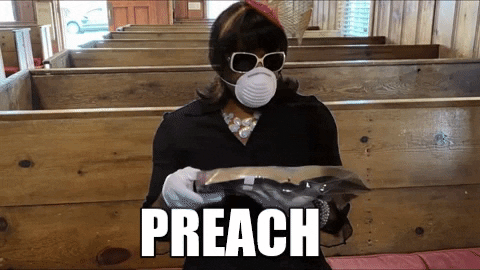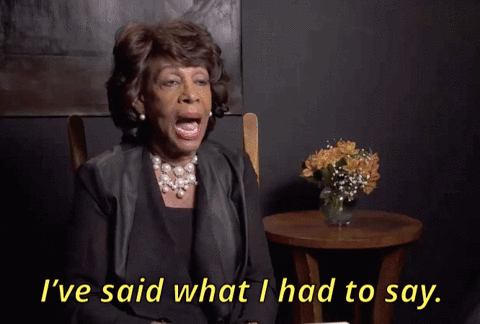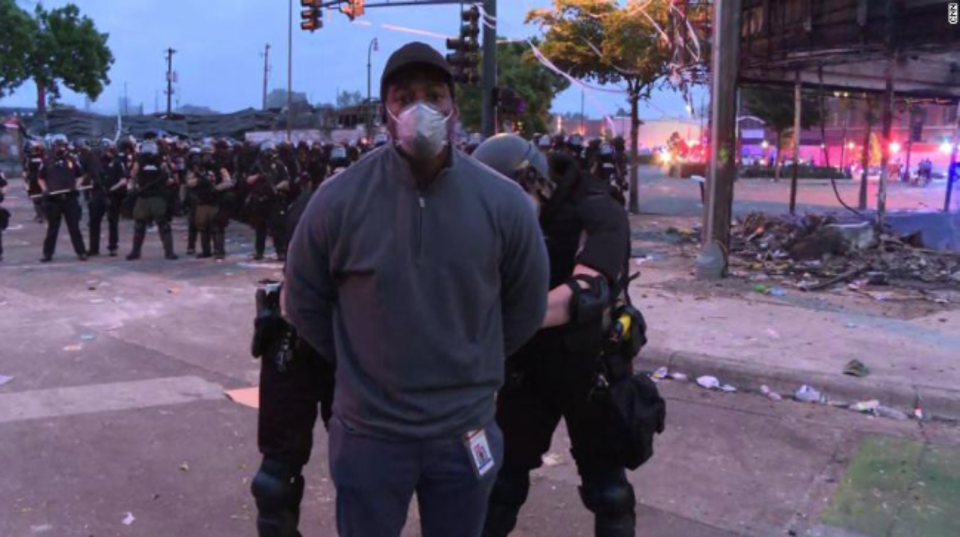Here for It w/ R. Eric Thomas, #178
Hi! It's R. Eric Thomas. From the internet?
Hi!
This week: on Christian Cooper, George Floyd, and Omar Jimenez and being good; the Normal People man takes a walk; and reviewing Hannah Gadsby’s new special.
Today is Pentecost, which is my favorite of the many church holidays that I didn’t know about until I met David, despite the fact that I grew up Very Religious. Our church lasted roughly 16 hours and yet we couldn’t find time to add in extra holidays? Unjust. Some of the other holidays I’d never heard of include Ash Wednesday, Maundy Thursday, and “Coffee Hour.” A wide world of wonders awaited me when he and I got together. I never knew that there were so many ways to have church!

Pentecost is so many things, actual and symbolic, and I think that’s why I like it. It’s a moment of transformation during which all of the disciples gained the ability to speak in other languages. In this way, it’s also a magic trick and you know how much I like magic! It’s also a masterpiece of evocative imagery—in the Bible it says that everyone in the room suddenly had divided tongues of fire over their heads. Like they were pre-apocalyptic Sims! Remarkable! I actually recall this from an illustration we saw in Sunday School, a cartoon of a bunch of white people in Biblical garb with tiny fires hovering just in front of their foreheads. I think we learned about the story but we didn’t learn the name, which is a shame because Pentecost is also really fun to say. The majority of my religious pedagogy centers on consonants in interesting combinations.
As David described it this morning in church, it’s also the moment when God gave people the Holy Spirit, so in this way Pentecost is a romcom, a meet-cute between the people of the world and the Holy Ghost. When churches celebrate Pentecost, they often wear red to commemorate the fire and the new relationship and the broken down barriers to communication. Some churches will replicate the descending tongues of fire by dropping rose petals on the congregation. So, when you think about it, the best explanation of Pentecost is that it’s this:
I mean that quite literally—Pentecost is Sasha Velour performing “So Emotional” by Whitney Houston, first seen on the finale of Rupaul’s Drag Race. No, I do not have theological support for this assertion; yes, I will take questions.
Anyway, today is Pentecost and there were no rose petals or tongues of fire in our little sanctuary in the living room, which feels like a dereliction of my personal brand. My personal brand being “throwing things in the air that will be annoying to clean up” or “a sudden burst of communication” or “randomly being aflame.” Even though the last essay in Here for It takes place in June and October, I wanted it, too, to be a Pentecost—a moment of understanding and transformation that was as exciting as it was stunning.
I didn’t intend to spend all this time talking about Pentecost, actually. I made a small vow to myself that my newsletter can’t just be me cribbing David’s sermon like he’s got a tongue of fire on his head and I’m lighting a Yankee candle off of it. But, I guess I said all that about Pentecost because I think it’s a wonderful metaphor for what’s possible, at least in theory. The idea that we’d all be able to suddenly understand each other is almost too wonderful to consider on a regular day, in our world filled with crossed purposes and misunderstandings and divergent interpretations. This week the promise of Pentecost and the distance we stand from it seems downright cruel. Not only are we locked in this snowglobe together with our individual wants and needs and allergies and opinions about pizza toppings, but we also spend all of our time here equipped with such different vocabularies and ways of understanding the world that we might as well be speaking different languages. And the fires that dot the landscape somehow never reach up to that space above our heads and so we fumble for meaning and connection, pointing and pantomiming, desperate to be heard.
I’ll put it a different way…
When Helena Andrews-Dyer and I started working on Reclaiming Her Time, the book that we co-wrote about Rep. Maxine Waters, we split up the chapters so that we could work on them around our schedules. The first chapter I tackled was on the L.A. Uprising in 1992. It was a huge undertaking—I wanted to tell the story well and thoroughly but at that point I was also afraid that people would crack open the book and, given my history writing about Waters, be disappointed to find that this part wasn’t particularly funny. I was afraid that I’d miscommunicated. I’ve gotten over that; there are funny parts in the book but we’re trying to cover someone’s life work as a public servant—sometimes the facts are interesting enough. And, as far as wit goes, your best bet is always going to be just quoting Maxine Waters directly and calling it a day.

Anyway, I say all that to say I jumped into this project by spending weeks reading everything I could about the uprising after the police officers who beat Rodney King were acquitted. I have read every single article the LA Times published on the uprising in 1992 and 1993. It was a dark period of research, but it was illuminating as well. I was, and remain, amazed at how similar that time was to our own. No, amazed is not the right word. I’m fascinated by the way that history rhymes with itself. But I think not hearing the rhyme is one way that we misunderstand each other. Bush, who was president at the time, called the people of South Central animals; Clinton, who was running for president, tried to be more moderate, but in that 1990s way that sounds pretty conservative nowadays. Meanwhile, Waters, when asked to decry the property damage and public rebellion, did not equivocate. “What did you expect?” she asked. She pointed out that these people had been abandoned by the government for years, penned in and abused. “What did you expect?” she responded, when her own offices were burned down. “What I tried to do,” she would later say, “was take it out of the discussion of ‘these are just no good, crazy rioting people’ and to talk about what I call an insurrection, which made a lot of white people mad.” Waters was trying to be understood, she was trying to talk about systems instead of walls. She was trying to be a tongue of fire for her constituents.
There’s a lot more I want to write about this—I mean, I spent months researching the 1992 insurrection and the 68 Watts rebellion and I’ve done a lot of thinking about the way that Waters in particular is heard and understood—but I don’t want to run the risk of seeming like I’m trying to promote a book here. I’m not. I’m also not trying to wade into the deep waters of litigating forms of protest at the expense of losing the thread on what the protests are actually about. I think today I’m merely suggesting that the words of a congresswoman or the language of the unheard can also be a Pentecost.
This week, a serious piece, a thirst journalism piece, and a comedy review!
Hannah Gadsby's Douglas Is A Second Date Disguised As Stand-Up

In her second filmed outing, Gadsby harnesses all the critiques lobbed at her and deftly incorporates them into her act, creating a stand-up routine that functions even better as an experiment with form. Responding to claims that she lectures onstage, she opens with a fifteen-minute preamble that outlines the entire show and, later, grabs a clicker and fires up a slide show to make a point about Renaissance art. This mix of exposition and education will be familiar to fans, but it takes on a giddy new air in Douglas. Here, the comedian is riding high on the unexpected but earned success of Nanette, but she's also dogged by it. Instead of crumbling under the unmanageable expectations that await her in this second go-round, she ramps them up even higher in her prelude, telling the viewers where we'll laugh and where we'll be shocked.
It Does Not Matter If You Are Good

At some point you learn to speak clearly and slowly, to widen your eyes a bit, perhaps to smile, in situations where the underlying danger of everyday existence races to the surface like an air bubble in murky water. Of course you do this with law enforcement, at a traffic stop or in a random encounter on the street, but you do this also in the most anodyne situations—with the train conductor when your ticket won’t scan, with the concierge at an apartment building, with the random white stranger who suddenly wants to know what you’re doing, where you’ve just come from, where you think you’re going. You learn to perform harmlessness, not as a way of selling yourself out—though it often feels like that—but as an attempt at heading off a conflict that seems to always be brewing. You learn—or, at least I, a black, cisgender man, learned—that there will be moments, random and unbidden, where to save your life you must convince a stranger that you are in some amorphous way good. And at the same time you learn that it probably will not make a difference.
Why Is This Hot Picture Of Hot Paul Mescal So Hot?

An emergency meeting of the International Council of Thirst Journalists was convened over Zoom today after paparazzi photos of Normal People star and hottie Paul Mescal broke through the malaise of the internet in a manner not unlike his character Connell's hidden emotional depths bursting through his emotionally stunted exterior at various points in his tumultuous relationship with Marianne.
Random Thing on the Internet
Okay, one more thing about Pentecost, sort of. I’ve been listening to the same playlist for weeks now but suddenly every song seems to have a connection to our moment of disconnect and the potential deliverance from it. Here’s three.
In “Human of the Year” by Regina Spektor, when she goes “outside the cars are beeping out a song just in your honor/ and though they do not know it, all mankind are now your brother…”
In “How Shall I See You Through My Tears” from Gospel at Colonnus, when the singer goes “Father sister, dearest voices/ I have found you, and I don't know how…”
And the entirety of “Now Let the Weeping Cease”, also from Gospel at Colonnus, an avant garde production that turns a piece of Greek theater into a black church service.
A sudden burst of communication,
Eric

